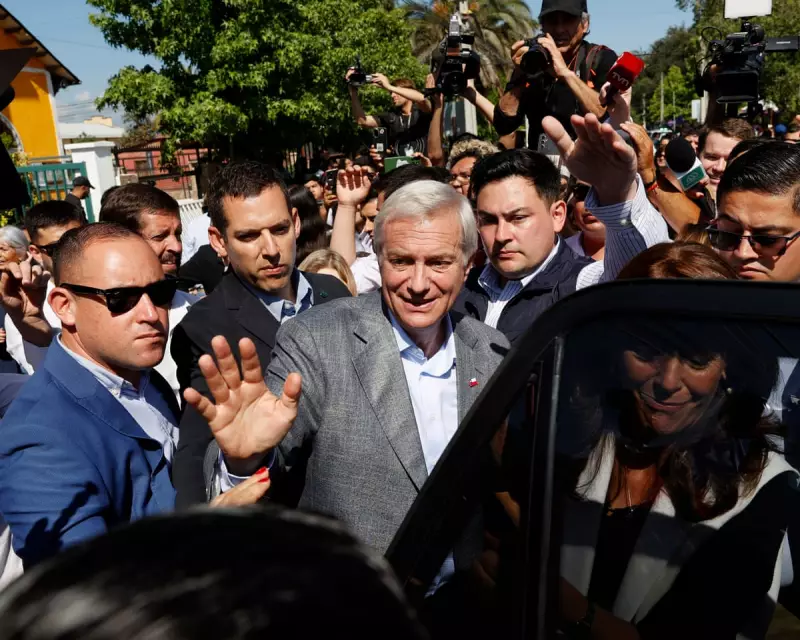
Chile has taken a dramatic political turn as far-right candidate José Antonio Kast emerged as the frontrunner following the first round of the country's presidential election. The ultraconservative lawyer secured his position in the decisive runoff after a campaign echoing the populist rhetoric of former US president Donald Trump.
Election Results Set Stage for Political Showdown
With more than 70% of ballots counted, Kast captured approximately 24% of the vote in Sunday's initial round. His opponent in the 14 December runoff will be Communist party candidate Jeannette Jara, who narrowly outperformed him with about 26% support.
The political landscape now favours Kast significantly after other right-wing candidates collectively secured nearly 30% of the vote. This consolidation of conservative support positions the controversial figure as the clear favourite to become Chile's next leader.
Conservative Alliance Forms Behind Kast
The election dynamics shifted dramatically when fellow right-wing contenders threw their support behind Kast. Johannes Kaiser, the radical libertarian who captured approximately 14% of votes, announced his endorsement, bluntly stating he backed Kast "because the alternative is Mrs Jara" and Chile's "lefty impoverishers".
Conservative candidate Evelyn Matthei, who won about 13% of votes, quickly followed with her own endorsement. She cited Chile's "absolutely uncontrolled arrival" of migrants and declared the country needed a "sharp change of direction".
Matthei appeared alongside Kast, telling supporters: "Please support Kast … It's super important that this government does not remain in power. We have too many problems."
Trump-Inspired Policies Dominate Kast's Platform
The 59-year-old lawyer, making his third presidential bid after losing to current president Gabriel Boric in 2021, has built his campaign around two central themes: combating crime and immigration.
Kast's most controversial proposal, dubbed "Escudo Fronterizo" (Border Shield), involves constructing miles of ditches, barriers and walls along Chile's northern border to deter migrants. This comes in response to the more than half million Venezuelans who have arrived in Chile fleeing their country's economic collapse.
"Chile has been invaded … but this is over," Kast declared in one campaign advertisement, mirroring Trump's immigration rhetoric.
In October, Kast celebrated US immigration statistics showing 1.6 million migrants had "self-deported" from the United States after 500,000 were deported under Trump. He suggested even more aggressive measures for Chile, stating: "That's [a proportion of] three-to-one. Here, we think that it can be four-to-one, or five-to-one."
Kast has also pledged a severe crackdown on foreign criminals, drawing inspiration from El Salvador's authoritarian leader Nayib Bukele, who has imprisoned at least 2% of his country's adult population since 2022. Public security has become a central election issue despite Chile remaining one of Latin America's safest countries.
Regional Political Shift and International Implications
Kast's strong performance signals a continuing rightward shift across South America that will be welcomed in Washington. Trump administration officials including Secretary of State Marco Rubio have hailed what they see as a conservative wave sweeping the region.
This trend recently manifested in neighbouring Bolivia, which elected a centre-right president after two decades of socialist rule. The political momentum appears to favour right-wing candidates in upcoming presidential elections in Colombia and Peru next year.
Even in Brazil, left-wing veteran Luiz Inácio Lula da Silva faces an uphill battle to retain the presidency despite former president Jair Bolsonaro's recent sentencing for masterminding a failed coup.
Outgoing Chilean president Gabriel Boric described the election as a "spectacular day of democracy" and congratulated both candidates advancing to the second round. Meanwhile, Jara reminded supporters that Chile remains a great country despite her opponents' claims to the contrary.
As Chile prepares for its 14 December runoff, the election represents not just a choice between two candidates but between starkly different visions for the country's future.





